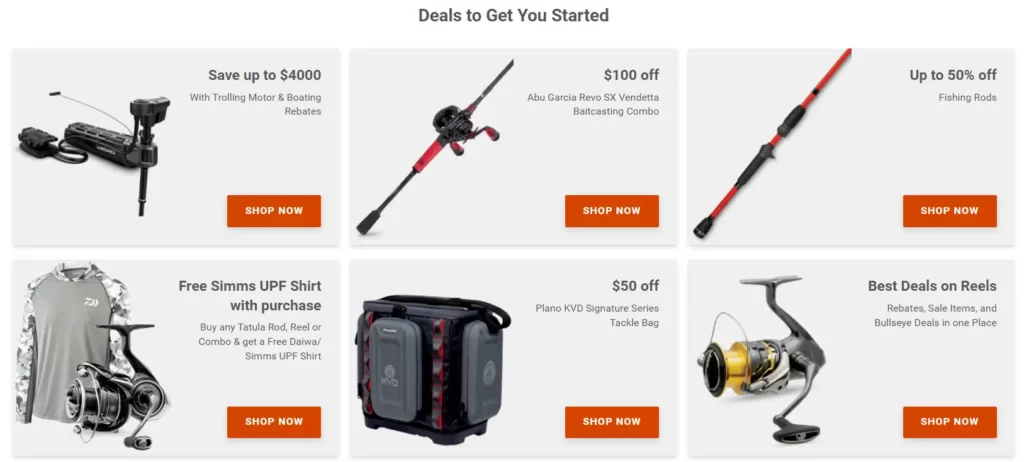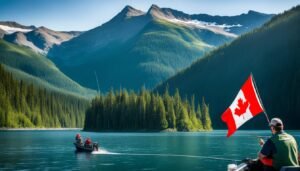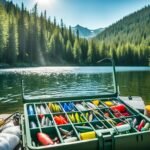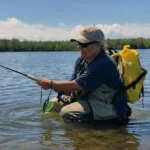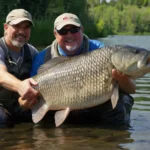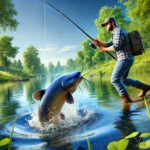Explore Canada's Ultimate Fishing, Hunting, and Wildlife Adventures
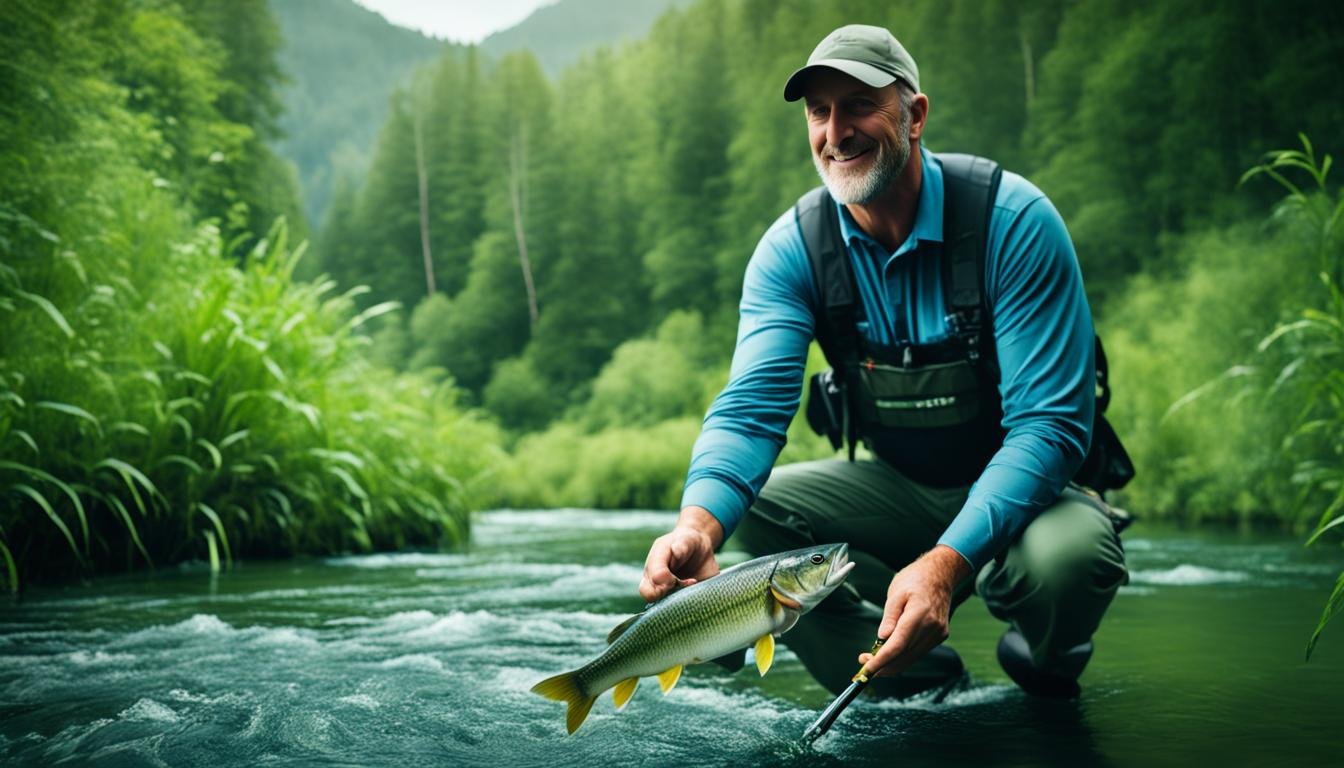
Protecting Our Waters: How Anglers Can Promote Conservation
Welcome to the world of angling, where the thrill of the catch meets a deeper commitment to environmental stewardship.
Have you ever wondered how anglers play a vital role in protecting our waters and promoting conservation?
Disclosure: When you purchase a service or a product through our links, we sometimes earn a commission, at no extra cost to you.
Is it merely a matter of catch and release, or is there more to it? Prepare to dive deeper into the world of angling and discover how anglers can contribute to the preservation of our ecosystems.
Key Takeaways about Protecting Our Waters
- Anglers play a crucial role in protecting our waters and promoting conservation.
- The bond between angling and aquatic health is deeply intertwined.
- Our aquatic systems face various challenges that impact their health and sustainability.
- Anglers serve as valuable participants in ecosystem surveillance and data collection.
- Compliance with fishing regulations is essential for environmental protection.
Anglers possess a unique understanding of the intrinsic bond between angling and aquatic health. They navigate the delicate balance of their sport, recognizing the challenges facing our aquatic systems, and adhering to fishing regulations.
Let’s explore the role of anglers in ecosystem surveillance, the principles of sustainable fishing, and actionable steps individuals can take to protect our waters. So, are you ready to unlock the secrets of angler conservation?
The Intrinsic Bond Between Angling and Aquatic Health
Angling and aquatic health share an inherent connection that shapes the experiences of anglers and the well-being of our water ecosystems. As anglers, you rely on healthy aquatic environments to pursue your sport, seeking vibrant fish populations and thriving habitats. However, your actions as anglers can also impact the delicate balance of these ecosystems.
A Harmony Shared: Anglers and the Environment
Anglers and the environment exist in a harmonious relationship, one where the conservation efforts of anglers directly benefit both themselves and the ecosystems they cherish. By actively participating in the conservation of aquatic habitats and species, you not only protect the natural environment but also safeguard the future of angling for generations to come.
The Mutual Benefits of Conservation to Anglers and Ecosystems
The conservation practices upheld by anglers not only contribute to the preservation of aquatic health but also provide mutual benefits to both anglers and ecosystems. By practicing sustainable fishing techniques, adhering to fishing regulations, and promoting conservation initiatives, anglers help maintain the delicate balance of aquatic ecosystems, ensuring continued angling opportunities and the preservation of diverse and abundant fish species.
Angling and conservation go hand in hand, fostering a mutually beneficial relationship that promotes the long-term health of our waters. By recognizing the significance of this bond and embracing the responsibility it entails, anglers can make a significant impact in sustaining the aquatic environments they love.
Disclosure: When you purchase a service or a product through our links, we sometimes earn a commission, at no extra cost to you.
Challenges Facing Our Aquatic Systems
Our aquatic systems are confronted with a multitude of challenges that threaten their health and sustainability. As human activities continue to impact our marine environments, it is essential to recognize and address these challenges in order to safeguard the future of our waters.
The Ripple Effect of Human Activities on Marine Life
Human activities, such as pollution, coastal development, and climate change, have a profound ripple effect on marine life. The discharge of pollutants into aquatic systems can disrupt the delicate balance of ecosystems, leading to harmful algal blooms, oxygen depletion, and the degradation of habitats.
Fly to Your Canadian Fishing Paradise
Book cheap flights to Canada's best fishing spots!
One search, all flights
Find the best deals to your favorite fishing spots
Kiwi.com Guarantee
Travel worry-free with our protection
Trusted by millions
Join anglers booking cheap flights with ease
Disclosure: When you purchase a service or a product through our links, we sometimes earn a commission, at no extra cost to you.
Coastal development can contribute to the loss of critical habitats, such as wetlands and coral reefs, which are vital for the survival of numerous marine species. Additionally, the rising sea temperatures and ocean acidification caused by climate change pose significant threats to marine life, including coral bleaching and the disruption of marine food chains.
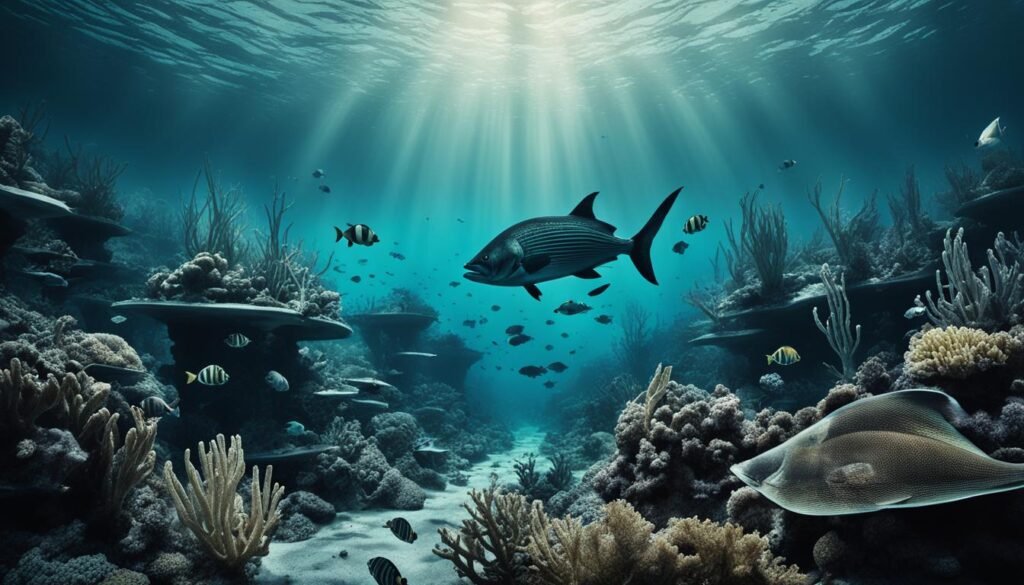
Understanding Overfishing and Its Impact on Sustainability
Overfishing is another pressing challenge that poses a threat to the sustainability of our aquatic systems. Unregulated or unsustainable fishing practices can deplete fish populations and disrupt the delicate balance of marine ecosystems.
By targeting certain species excessively, overfishing can lead to the collapse of fish stocks, affecting not only the targeted species but also the entire food web within the aquatic system. This has far-reaching consequences, impacting the livelihoods of fishing communities and threatening the availability of seafood for future generations.
To ensure the long-term sustainability of our aquatic systems, it is crucial to address the challenges posed by human activities and combat the negative impacts of overfishing. Through responsible stewardship and conservation efforts, we can protect and restore the health of our waters, preserving the incredible biodiversity and ecological balance that marine life relies on.
The Role of Anglers in Ecosystem Surveillance
Anglers play a crucial role in the surveillance of our ecosystems, acting as early detectors of ecological changes and contributing to data collection and reporting. Their close connection to the environment allows them to observe and recognize any signs of environmental degradation, making them invaluable in the protection and management of our waters.
Anglers as Early Detectors of Ecological Changes
Anglers possess a unique perspective and firsthand knowledge of the natural world. By spending time on the water and engaging in their favorite pastime, anglers develop an intimate understanding of the ecosystems they frequent. This deep familiarity allows them to notice even subtle shifts or anomalies that may indicate ecological changes.
Whether it’s a decline in fish populations, shifts in the behavior of aquatic organisms, or alterations in water quality, anglers are often the first to recognize these changes. Their ability to detect early warning signs is crucial in identifying potential threats to the health and balance of our water systems.
Contribution to Data Collection and Reporting
In addition to being early detectors of ecological changes, anglers also contribute significantly to data collection and reporting. Their observations, along with other scientific data, provide valuable insights into the state of our aquatic ecosystems.
Anglers can document their observations through various means, such as recording catch data, noting changes in water conditions, or reporting unusual sightings. This information can be shared with relevant authorities, scientific organizations, or citizen science initiatives, contributing to a comprehensive understanding of ecosystem health.
The active participation of anglers in data collection and reporting enables researchers and conservationists to make informed decisions about managing and protecting our waters. By voicing their observations and concerns, anglers become advocates for the preservation and sustainable management of our valuable natural resources.
Compliance and the Importance of Fishing Regulations
The Science Behind Fishing Laws and Environmental Protection
Compliance with fishing regulations is crucial for environmental protection and the sustainability of fish populations. Fishing laws are not arbitrary rules; they are backed by scientific knowledge and research that aim to ensure the long-term health of our waters and aquatic ecosystems.
These regulations are designed to prevent overfishing, protect vulnerable species, and promote the overall balance and well-being of our marine environments. Adhering to fishing regulations is an essential part of responsible angling and demonstrates a commitment to environmental stewardship.
Fishing regulations are rooted in scientific principles and data-driven decision making. They take into account factors such as fish population dynamics, reproductive cycles, and the ecological interdependencies within aquatic ecosystems. By putting restrictions on catch limits, fishing seasons, and gear types, these regulations allow fish populations to thrive and recover, ensuring their sustainable existence for future generations.
How Adherence to Regulations Supports Healthy Fish Populations
Adherence to fishing regulations plays a significant role in supporting the preservation of healthy fish populations. By following these regulations, anglers contribute to maintaining the natural balance within ecosystems and help prevent the depletion of fish stocks.
These regulations often include measures such as catch-and-release practices, size limits, and protected areas where fishing is prohibited. These measures allow fish to grow and reproduce, contributing to the overall resilience and genetic diversity of fish populations. Compliance with these regulations ensures that enough fish remain in the water to maintain healthy populations and foster sustainable fishing opportunities for anglers.
Additionally, adherence to fishing regulations helps prevent the unintended capture of non-target species and reduces the impact on sensitive habitats. By minimizing bycatch and avoiding damaging fishing practices, anglers can actively contribute to the protection of marine biodiversity and the overall ecological integrity of our waters.
Principles of Sustainable Fishing
Sustainable fishing is crucial for maintaining the long-term health of our aquatic ecosystems. By implementing responsible angling practices and adapting effective fisheries management strategies, we can achieve ecological balance and ensure the future viability of our fish stocks.
Critical Factors for Sustainable Angling Practices
To promote sustainable fishing, several critical factors must be considered:
- Targeted Species: It is essential to identify and target fish species that are abundant and can sustain harvesting without compromising their populations or the overall ecosystem.
- Proper Gear and Techniques: Anglers should use appropriate gear and techniques that minimize harm to non-targeted species and their habitats.
- Size and Bag Limits: Adhering to size and bag limits helps prevent overfishing and ensures that fish have the opportunity to reproduce and replenish their populations.
- Selective Harvesting: Selective harvesting allows anglers to release smaller or less desirable fish, helping maintain healthy population structures and genetic diversity.
- Seasonal Considerations: Understanding and respecting breeding seasons and migration patterns of fish species helps protect their reproductive success and overall survival.
Adapting Fisheries Management for Ecological Balance
Effective fisheries management plays a vital role in achieving ecological balance. Here are some key aspects to consider:
- Research and Monitoring: Conducting thorough research and monitoring of fish stocks and their habitats provides valuable data for informed decision-making and sustainable management practices.
- Collaboration and Stakeholder Engagement: Collaboration between government agencies, scientists, anglers, and other stakeholders ensures diverse perspectives and participation in conservation efforts.
- Regulatory Measures: Implementing and enforcing fishing regulations, such as size and bag limits, closed seasons, and protected areas, helps prevent overfishing and protects vulnerable species.
- Adaptive Management: Employing adaptive management approaches allows for flexibility in response to new data and changing environmental conditions, ensuring continuous improvement in fisheries management practices.

By embracing these principles and working together, we can secure sustainable fishing practices that preserve our aquatic ecosystems for future generations.
Protecting Our Waters: Actionable Steps for Individual Contribution
As an angler or anyone concerned about the health of our aquatic environments, you have the power to make a difference. By taking proactive measures, you can contribute to protecting our waters and ensuring the preservation of our precious ecosystems. Here are some practical and actionable steps you can take to be part of the solution:
- Practice Responsible Fishing: Follow fishing regulations and practice catch-and-release techniques whenever possible. This helps maintain healthy fish populations and preserves the balance of aquatic ecosystems.
- Reduce Pollution: Minimize your impact on water quality by properly disposing of trash, using eco-friendly fishing gear, and avoiding excessive use of chemicals near water bodies.
- Support Conservation Organizations: Get involved with local or national conservation organizations that work towards protecting our waters. Donate, volunteer, or participate in their initiatives to make a meaningful contribution.
- Participate in Habitat Restoration: Join habitat restoration projects in your area to improve the health and vitality of aquatic ecosystems. Plant native vegetation, remove invasive species, or contribute to the rebuilding of fish habitats.
- Spread Awareness: Educate others about the importance of protecting our waters and the impact of individual actions. Use social media, blogs, or community events to raise awareness and inspire others to take action.
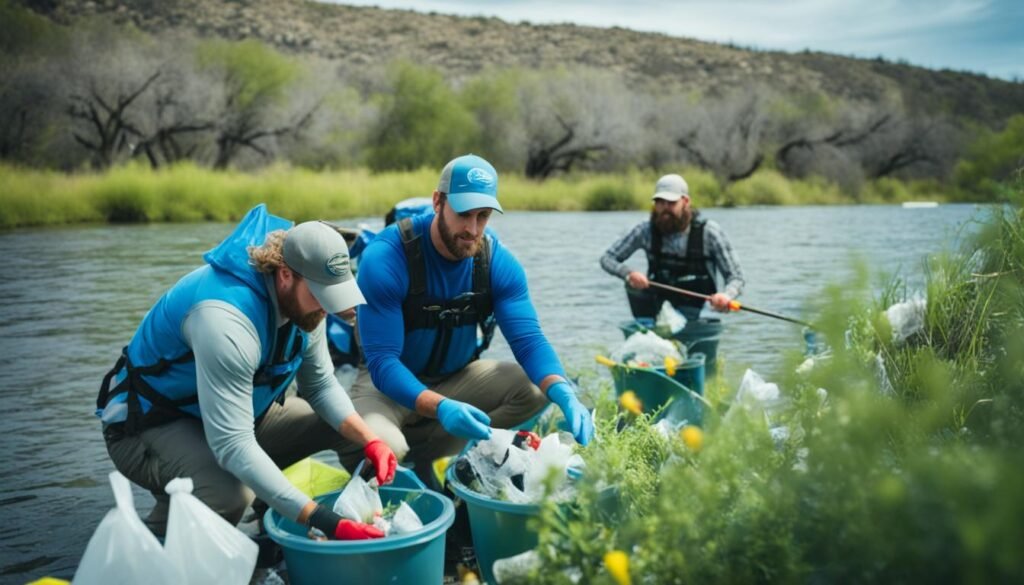
Remember, even small steps can lead to significant change. By taking these actionable measures, you are playing a crucial role in safeguarding our waters for future generations. Together, we can make a positive impact and ensure the long-term sustainability of our aquatic ecosystems.
Fishing Conservation and Personal Responsibility
As an angler, it is essential to recognize the role you play in fishing conservation and the importance of personal responsibility in preserving our waters. Environmental stewardship starts with you, and adopting practices that go beyond catching fish is crucial for maintaining the health and sustainability of our aquatic ecosystems.
Environmental Stewardship Starts with You
Being a responsible angler means understanding the impact of your actions on the environment and taking steps to minimize any negative consequences. When you make conservation a priority, you contribute to the overall well-being of aquatic habitats and ensure that future generations can enjoy the same fishing opportunities.
Here are some ways you can practice environmental stewardship:
- Properly dispose of waste: Carry a trash bag with you and dispose of any trash, including fishing line, plastic packaging, and bait containers, in designated bins. Avoid leaving any garbage in or near the water.
- Respect wildlife: Observe wildlife from a distance, avoiding any unnecessary disturbance. Do not damage or remove vegetation, nests, or habitats.
- Choose eco-friendly products: Use biodegradable fishing line, non-toxic lures, and sustainable fishing gear. Opt for lead-free sinkers to prevent lead contamination in water bodies.
Practices That Preserve: Beyond Catching Fish
Preserving our waters involves more than simply catching and releasing fish. By adopting practices that go beyond fishing, you can contribute to the long-term conservation of our aquatic ecosystems. Here are some suggestions:
- Practice catch-and-release techniques: When catching fish, handle them with care to minimize stress and injury. Use barbless hooks to facilitate safe and easy release, allowing the fish to return to its habitat unharmed.
- Support habitat restoration initiatives: Participate in or contribute to projects that focus on restoring and improving fish habitats. These initiatives can include activities such as planting vegetation, removing invasive species, and creating fish spawning areas.
- Engage in citizen science: Contribute to scientific research and conservation efforts by reporting your fishing observations and participating in projects that collect data on fish populations, water quality, and ecosystem health.
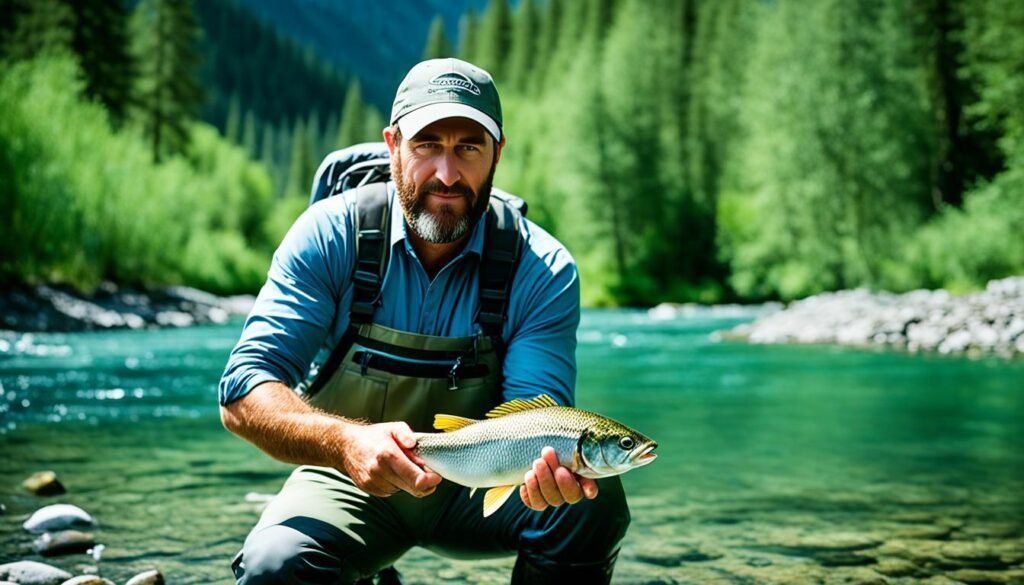
| Impact of Personal Responsibility on Fishing Conservation | Positive Outcomes |
|---|---|
| Responsible waste management | Reduction of pollution and protection of aquatic habitats |
| Respecting wildlife and habitats | Preservation of biodiversity and undisturbed ecosystems |
| Using eco-friendly products | Prevention of water contamination and reduction of ecological harm |
| Practicing catch-and-release techniques | Minimization of fish mortality and preservation of fish populations |
| Supporting habitat restoration initiatives | Improvement of fish habitats and overall ecosystem health |
| Engaging in citizen science | Contribution to scientific knowledge and informed conservation decisions |
Taking personal responsibility for your actions as an angler is crucial in promoting fishing conservation and preserving our waters for future generations. By practicing environmental stewardship and adopting practices that go beyond catching fish, you can make a significant positive impact on our aquatic ecosystems.
How Freshwater Fishing Promotes Conservation of Habitats
Freshwater fishing is not only an enjoyable recreational activity but also a significant contributor to the conservation of habitats. As anglers, you play a crucial role in preserving the delicate balance of freshwater ecosystems and ensuring the sustainability of fish populations.
The Financial Flow: License Fees Directing Conservation Efforts
One way that freshwater fishing supports habitat conservation is through the financial flow generated by license fees. When you obtain a fishing license, a portion of the fees you pay goes directly towards funding conservation efforts. These funds help support initiatives aimed at protecting and restoring habitats, improving water quality, and managing and conserving fish populations.
By contributing financially through license fees, you are actively participating in the conservation of habitats and contributing to the long-term viability of freshwater ecosystems. Your support enables conservation organizations and government agencies to implement projects and programs that benefit both the environment and the angling community.
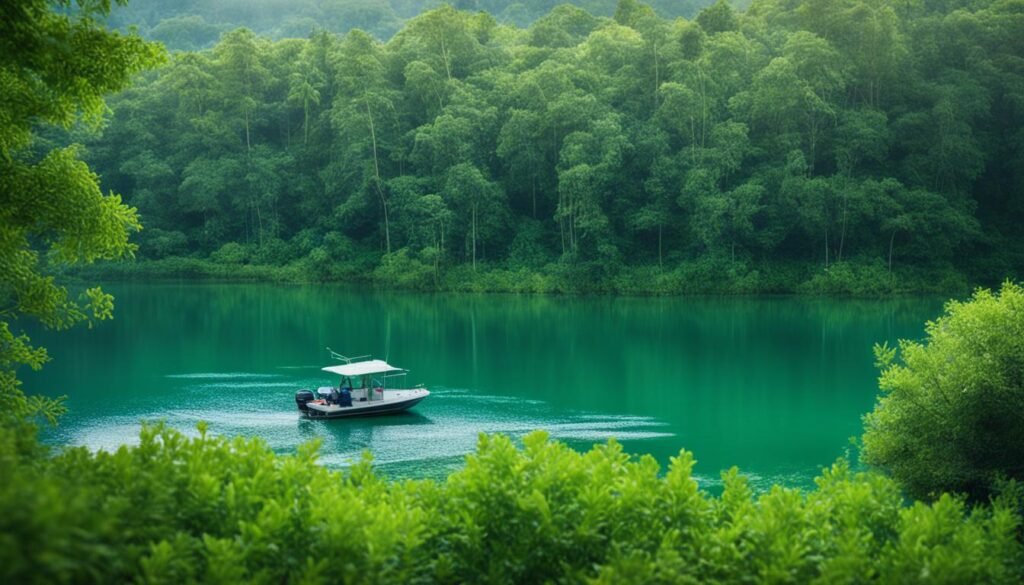
From Tackle to Trust Funds: The Excise Tax Path
Another way that freshwater fishing promotes habitat conservation is through the excise tax levied on fishing equipment and related items. This excise tax, also known as the Federal Aid in Sport Fish Restoration (SFR) program, channels a percentage of the revenue generated from the sale of fishing equipment towards conservation efforts.
The SFR program has been instrumental in funding habitat restoration projects, fish stocking programs, research initiatives, and educational programs aimed at promoting sustainable fishing practices. These efforts not only contribute to the preservation and restoration of habitats but also enhance the overall fishing experience for anglers.
| Benefits of License Fees and Excise Tax | Examples |
|---|---|
| Preservation of freshwater habitats | 1. Wetland conservation projects 2. Streambank stabilization initiatives |
| Restoration of degraded habitats | 1. Reforestation programs 2. Removal of invasive species |
| Improvement of water quality | 1. Pollution prevention measures 2. Nutrient management strategies |
| Conservation of fish populations | 1. Stocking programs 2. Research on fish migration patterns |
By supporting the excise tax system and purchasing fishing equipment, you are indirectly contributing to the conservation of habitats and the enhancement of freshwater ecosystems. These efforts ensure that future generations will continue to enjoy the thrill of freshwater fishing in thriving and healthy environments.
Conclusion
In conclusion, anglers have the power to promote conservation and protect our waters. By recognizing your intrinsic bond with the environment, understanding the challenges facing aquatic systems, and actively participating in ecosystem surveillance and sustainable fishing practices, you can make a significant difference. It is time for you to embrace your role as stewards of the environment and create a wave of change to ensure a sustainable future for our waters.
Reeling in the Future: Fishing for Conservation Success
As an angler, your actions play a vital role in the overall health and well-being of our aquatic ecosystems. By practicing responsible fishing techniques and adhering to regulations, you can help preserve fish populations and protect the delicate balance of our waters. By making conservation a priority, you are ensuring that future generations can enjoy the thrill of angling and experience the wonders of our natural world.
Creating a Wave of Change: The Angler’s Pledge to Protect
We call upon all anglers to take the Angler’s Pledge to Protect. By taking this pledge, you commit to being a responsible angler and making a positive impact on our waters. Promise to follow fishing regulations, practice catch-and-release whenever possible, and actively participate in conservation efforts. Together, we can create a wave of change and inspire others to join us in safeguarding our precious aquatic resources.
FAQ About Protecting Our Waters
How do anglers promote conservation?
Anglers promote conservation by understanding the intrinsic bond between angling and aquatic health, recognizing the challenges facing our aquatic systems, and adhering to fishing regulations.
What is the harmony shared between anglers and the environment?
The harmony shared between anglers and the environment is the mutual benefit that comes from conservation efforts. Anglers rely on healthy aquatic ecosystems to enjoy their sport, and their actions to protect and preserve these ecosystems benefit both themselves and the environments they cherish.
What challenges do our aquatic systems face?
Our aquatic systems face challenges such as the ripple effect of human activities on marine life and the detrimental impact of overfishing on sustainability.
What role do anglers play in ecosystem surveillance?
Anglers serve as valuable participants in ecosystem surveillance, acting as early detectors of ecological changes and contributing to data collection and reporting.
Why is compliance with fishing regulations crucial?
Compliance with fishing regulations is crucial for environmental protection and the sustainability of fish populations.
What are the critical factors for sustainable angling practices?
The critical factors for sustainable angling practices include adapting fisheries management strategies to achieve ecological balance and ensure the future viability of fish stocks.
What actionable steps can individuals take to protect our waters?
Individuals can take practical steps such as practicing catch-and-release fishing, reducing their carbon footprint, and participating in conservation efforts to protect our waters.
How can anglers contribute to fishing conservation?
Anglers can contribute to fishing conservation through personal responsibility and environmental stewardship, going beyond catch-and-release fishing, and supporting conservation efforts through license fees and excise taxes.
How does freshwater fishing promote the conservation of habitats?
Freshwater fishing promotes the conservation of habitats through the financial flow from license fees and excise taxes, which supports conservation efforts and ensures the preservation of freshwater ecosystems and the sustainability of fish populations.


